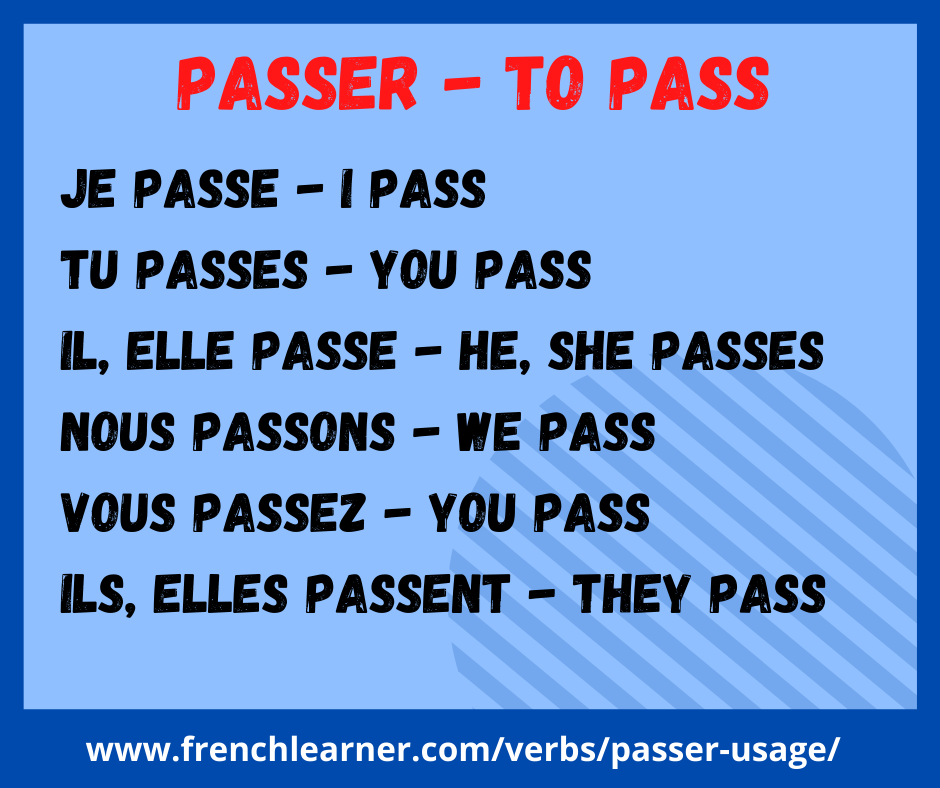 The verb passer means “to pass”. At first glace passer seems very basic with lots of direct translations from English. However, passer actually has a lot of meanings. Below we’ll look at the various usages of passer with example sentences.
The verb passer means “to pass”. At first glace passer seems very basic with lots of direct translations from English. However, passer actually has a lot of meanings. Below we’ll look at the various usages of passer with example sentences.
passer – to go by
- Le train passe à 9h00. The train comes by at 9 o’clock.
- Je passe devant ta maison. I go by your house.
passer chez quelqu’un – to go by somebody’s palce
- Mon voisin passe chez moi pour manger. My neighbor comes by my place to eat.
- Je passerai chez toi demain à midi. I’ll come by your place tomorrow at noon.
passer – use with time
- Le temps passe si vite en été. Time goes by so fast during the summer.
passer – to be broadcast, played
- La chanson passe à la radio. The song is played on the radio.
- Le film passe à la télé. The movie is played on TV.
passer son temps à + infinitive – to spend your time doing
- Elle passe tout son temps à se plaindre. She spends all her time complaining.
- Je passe mon temps à faire du sport. I spend my time exercising.
se passser – to happen, going on
- Qu’est-ce qui se passe ici? What’s happening/going on here?
- Ça s’est bien passé? Did it go well?
passer de…à
Passer de…à means to go from one state to another.
- Je passe souvent de rire aux larmes.
I often go from laughing to tears (crying).
passer avant vs. après
This usage would equate to “to come before everything” in English.
- Ses petits-enfants passent avant tout. Elle passe après.
Her grandchildren come before everything. She comes after.
passer sur quelque chose
Passer sur quelque chose equate to forgive or pardon.
- Je passe sur ses défauts. Il fait de son mieux.
I forgive his shortcomings. He’s trying his hardest.
passer quelqu’un à quelqu’un
This is polite phone language.
- Ne quitttez pas. Je vous passe mon mari.
Please hold. I’ll put my husband on the line.
y passer
Y passer means to die or pass away.
- Il a eu en accident dans la maison et il a failli y passer.
He had an accident and almost died.
passer pour
Passer pour means to look like or come off as.
- Il passer pour un con (slang, vulgar)! He looks like a fool!
passer quelque chose à quelqu’un
- Passe-moi le sel, s’il te plait. Pass me the salt please.
- Un joueur passe le ballon à l’autre joueur. One player passes the ball to another player.
se faire passer pour
Se faire passer pour means to prentend to be.
- Il se fait passer pour une vedette du cinéma.
He pretends to be a movie star.
se passer de
Se passer de means to not be able to live or do without.
- Je ne peux pas me passer de cafe. J’en bois tous les matins.
I can’t live or do without coffee. I drink it every morning.
Related lessons:
- passer conjugation tables
- passer comme une lettre à la poste (expression)
- passer l’arme à gauche (expression)
- passer un savon à quelqu’un (expression)



